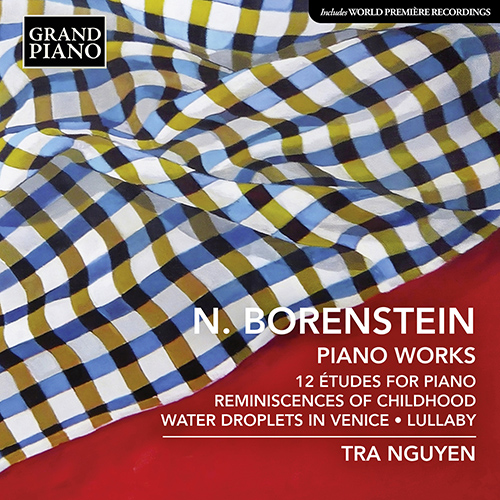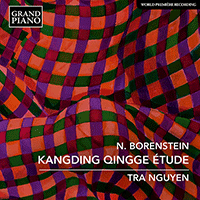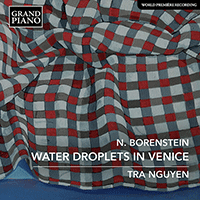
About this Release
“I had been already interested in Nimrod Borenstein’s music before so when he was talking about his 24 Études Project I was all ears. One aspect that makes all the études very difficult is that they are polyphonic by nature, and then the composer adds another layer of polyrhythm on top so that individual voices have individual pulses for musical expression. The result is that the music is mesmerisingly layered. But this is also the crux of key difficulties faced by the performer. Very often the music is dense with multiple voices that come with different pulses, starting at different points. The key is to understand their function to serve as musical expression. Half Moon Etude and the Kangding Quingge Etude are amongst my favourites for their sonority and the mesmerising colours. The progress of learning this new repertoire for me was an inspirational and rewarding one, full of challenges and surprises. It allowed me to hear the instrument with new timbres and to acquire a deeper understanding of the unique musical structures the composer was creating. The études require both virtuosity in physical aspects of playing, and virtuosity in listening and musical thinking.” — Tra Nguyen
BORENSTEIN, NIMROD (b. 1969)
Piano Works
- Tra Nguyen, piano
Nimrod Borenstein’s music has become ever more prominent and popular in recent years and his piano works exemplify his communicative and vitalising spirit. The two sets of Études, inspired by Chopin, some of which are based on a culture, country or myth, employ Borenstein’s personal use of polyrhythms which allow melodies to float and glide in new, virtuosic and colourful ways. Reminiscences of Childhood is a suite exploring the innocence, playfulness and drama of early childhood. Acclaimed British-Vietnamese pianist Tra Nguyen describes Borenstein’s music as ‘inspirational and rewarding’.
Tracklist
|
Études, Op. 66 (2019) (00:19:00 )
|
|
1
No. 1. Ostinato Étude, Op. 66, No. 1 (00:03:09)
|
|
2
No. 2. Half Moon Étude, Op. 66, No. 2 (00:03:29)
|
|
3
No. 3. Tango Étude, Op. 66, No. 3 (00:02:14)
|
|
4
No. 4. Arpeggio Étude, Op. 66, No. 4 (00:02:13)
|
|
5
No. 5. Kangding Qingge Étude, Op. 66, No. 5 (00:02:58)
|
|
6
No. 6. Méphisto Étude, Op. 66, No. 6 (00:05:41)
|
|
Études, Op. 86 (2020) (00:15:00 )
|
|
7
No. 7. Staccato/Legato Étude, Op. 86, No. 1 (00:01:54)
|
|
8
No. 8. Chords Étude, Op. 86, No. 2 (00:04:10)
|
|
9
No. 9. Hidden Melodies Étude, Op. 86, No. 3 (00:02:41)
|
|
10
No. 10. Brazilian Étude, Op. 86, No. 4 (00:01:50)
|
|
11
No. 11. Toccata Étude, Op. 86, No. 5 (00:02:49)
|
|
12
No. 12. Japanese Gardens Étude, Op. 86, No. 6 (00:03:47)
|
|
Reminiscences of Childhood, Op. 54 (2012) (00:11:00 )
|
|
13
No. 1. Lucilla's Beehive (00:04:13)
|
|
14
No. 2. Uchti-Tuchti (00:02:05)
|
|
15
No. 3. The Melancholic Mobile (00:04:57)
|
|
16
Water Droplets in Venice, Op. 75, No. 2 (2019) (00:02:41)
|
|
17
Lullaby, Op. 81a (2018) (00:04:47)
|
The Artist(s)
 British-Vietnamese Tra Nguyen gave her first concert, performing Mozart’s Piano Concerto, K. 488, with the Hanoi Conservatory Orchestra. Since then she has continued to engage audiences in other important venues worldwide. Recent and future performances include Queen Elizabeth Hall, Tokyo Opera City, Hong Kong City Recital Hall, Cadogan Hall and Wigmore Hall amongst others. Her imaginative programming balances core repertoire and lesser-known music, winning critical praise. Her discography introduces many world première recordings of neglected music. Volumes 1–6 of her recordings of Joachim Raff’s piano music have earned wide critical acclaim, including Album of the Week by The Independent. Tra Nguyen studied with Lev Naumov at the Moscow Conservatory and with Christopher Elton at the Royal Academy of Music where she received the academy’s highest award for her final recital. She was awarded the ARAM (Associate of the Royal Academy of Music) for her “significant contribution to the music profession” in 2013.
British-Vietnamese Tra Nguyen gave her first concert, performing Mozart’s Piano Concerto, K. 488, with the Hanoi Conservatory Orchestra. Since then she has continued to engage audiences in other important venues worldwide. Recent and future performances include Queen Elizabeth Hall, Tokyo Opera City, Hong Kong City Recital Hall, Cadogan Hall and Wigmore Hall amongst others. Her imaginative programming balances core repertoire and lesser-known music, winning critical praise. Her discography introduces many world première recordings of neglected music. Volumes 1–6 of her recordings of Joachim Raff’s piano music have earned wide critical acclaim, including Album of the Week by The Independent. Tra Nguyen studied with Lev Naumov at the Moscow Conservatory and with Christopher Elton at the Royal Academy of Music where she received the academy’s highest award for her final recital. She was awarded the ARAM (Associate of the Royal Academy of Music) for her “significant contribution to the music profession” in 2013.
The Composer(s)
 The past few years have seen a great number of Nimrod Borenstein’s works being commissioned, recorded and premiered at the most prestigious venues and festivals across the globe, from the Royal Festival Hall and Royal Opera House in London to the Salle Gaveau in Paris, Carnegie Hall in New York, and Hong Kong City Hall. His music is performed regularly throughout Europe, Canada, Australia, the Far East, Israel, South America, Russia and the USA. In recent years, he has been commissioned to write the obligatory performance pieces for the Hong Kong International Piano Competition (2019) and the International Jeunesses Musicales Competition for violoncello (2020).
The past few years have seen a great number of Nimrod Borenstein’s works being commissioned, recorded and premiered at the most prestigious venues and festivals across the globe, from the Royal Festival Hall and Royal Opera House in London to the Salle Gaveau in Paris, Carnegie Hall in New York, and Hong Kong City Hall. His music is performed regularly throughout Europe, Canada, Australia, the Far East, Israel, South America, Russia and the USA. In recent years, he has been commissioned to write the obligatory performance pieces for the Hong Kong International Piano Competition (2019) and the International Jeunesses Musicales Competition for violoncello (2020). Reviews
“…a worthy addition to Borenstein’s impressive discography.” – Fanfare
“Tra Nguyen plays with nuance and virtuosity and gets a larger-than-life recording.” – American Record Guide



 Grand Piano has gained a reputation for producing high quality recordings of rare keyboard gems. Dedicated to the exploration of undiscovered piano repertoire, the label specialises in complete cycles of piano works by many lesser-known composers, whose output might otherwise have remained unknown and unrecorded.
Grand Piano has gained a reputation for producing high quality recordings of rare keyboard gems. Dedicated to the exploration of undiscovered piano repertoire, the label specialises in complete cycles of piano works by many lesser-known composers, whose output might otherwise have remained unknown and unrecorded.






